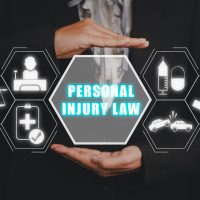Understanding California’s Personal Injury Law

A personal injury claim doesn’t always require the filing of a lawsuit, and much less often than that does it require actually going to trial. But from the very start after an accident, California personal injury law plays a huge role in determining who is at fault for causing the accident and how much they owe in compensation to the injury victim. Working with an attorney who is thoroughly knowledgeable on the law and experienced in settling claims with insurance companies will help ensure that your claim is successful and settles for an appropriate amount. See below for a look at the basics of personal injury law in California. If you or a loved one has been hurt by the negligence of another in Southern California, contact Machtinger Law, APC, to review your case with a compassionate and dedicated Los Angeles personal injury lawyer.
What Is Personal Injury Law?
Personal injury law, also known as tort law, allows individuals to obtain compensation for injuries resulting from someone else’s wrongful actions. These injuries can be physical, emotional, or both, and the law covers a wide range of incidents, including vehicle accidents, slip and falls, defective products, negligent security, and more.
Understanding Negligence
Negligence is a fundamental concept in personal injury law. It refers to the failure to exercise reasonable care to prevent harm to others. To prove negligence in California, the plaintiff must establish four key elements:
- Duty of Care: The defendant had a legal obligation to act with reasonable care toward the plaintiff.
- Breach of Duty: The defendant failed to meet this obligation.
- Causation: The defendant’s breach of duty directly caused the plaintiff’s injuries.
- Damages: The plaintiff suffered actual harm or losses as a result.
Determining Liability
Liability in personal injury cases is about determining who is legally responsible for the harm suffered by the plaintiff. In California, liability can be based on negligence, strict liability, or intentional conduct. In some cases, multiple parties may be held liable, and the concept of comparative negligence may apply, allowing for the apportionment of fault among different parties.
Types of Damages
Damages in personal injury cases are meant to compensate the injured party for their losses. In California, damages can be classified into two main categories:
- Economic Damages: These are losses based on money that comes out of your pocket, including past and future medical care, past and future lost income, and property damage.
- Non-Economic Damages: These are all the other losses a personal injury victim can experience, including pain, disfigurement, physical impairment, mental and emotional suffering, grief, anxiety, humiliation, and the loss of enjoyment of life.
The Role of a Personal Injury Attorney
Navigating the complexities of personal injury law can be challenging. A skilled personal injury attorney can provide invaluable assistance by:
- Evaluating your case: An attorney can assess the merits of your case and determine the best legal strategy.
- Gathering evidence: Collecting and preserving evidence is crucial for building a strong case.
- Negotiating with insurance companies: An experienced attorney can negotiate with insurance companies to ensure you receive fair compensation.
- Representing you in court: If a settlement cannot be reached, an attorney can represent you in court and advocate for your rights.
Contact Machtinger Law for Help With a Personal Injury Claim in Los Angeles or Southern California
At Machtinger Law, APC, we are dedicated to providing our clients with the knowledgeable and compassionate legal representation they need to secure the compensation they deserve. If you have been injured in Los Angeles or throughout Southern California and need legal assistance with your claim, call us today at 310-943-9300 for a free consultation to discuss your case.
